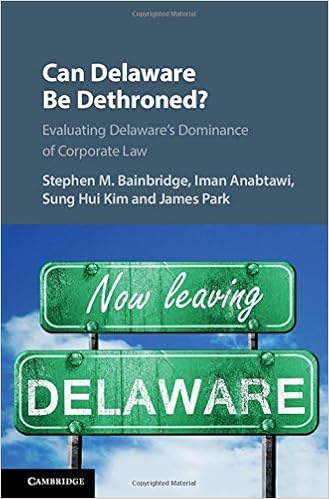 Among the February 1, 2017 New Books List at Brooklyn Law School Library, which has 76 print titles and 55 e-book titles, is Can Delaware be Dethroned? Evaluating Delaware’s Dominance of Corporate Law (edited by, among others, UCLA Law Professors Stephen Bainbridge and James Park, formerly of Brooklyn Law School). At 266 pages, this book is aimed at corporate lawyers, academics, regulators, and judges. The practitioners and academics who have contributed essays to this volume provide sophisticated analyses of what makes Delaware the leading source of corporate law and describe the challenges that Delaware faces from other states and the federal government. Bainbridge states that Delaware law is neither pro-management nor pro-shareholder yet manages to retain its dominant position largely because of its Courts, particularly its Court of Chancery, devoted largely to corporate law cases. Businesses thrive best in an environment of predictability and certainty.
Among the February 1, 2017 New Books List at Brooklyn Law School Library, which has 76 print titles and 55 e-book titles, is Can Delaware be Dethroned? Evaluating Delaware’s Dominance of Corporate Law (edited by, among others, UCLA Law Professors Stephen Bainbridge and James Park, formerly of Brooklyn Law School). At 266 pages, this book is aimed at corporate lawyers, academics, regulators, and judges. The practitioners and academics who have contributed essays to this volume provide sophisticated analyses of what makes Delaware the leading source of corporate law and describe the challenges that Delaware faces from other states and the federal government. Bainbridge states that Delaware law is neither pro-management nor pro-shareholder yet manages to retain its dominant position largely because of its Courts, particularly its Court of Chancery, devoted largely to corporate law cases. Businesses thrive best in an environment of predictability and certainty.
Delaware is the state of incorporation for almost two-thirds of the Fortune 500 companies, as well as more than half of all companies listed on the New York Stock Exchange, NASDAQ, and other major stock exchanges. In recent years, however, some observers have suggested that Delaware’s competitive position is eroding. Other states have long tried to chip away at Delaware’s position, and recent Delaware legal developments may have strengthened the case for incorporating outside Delaware. The federal government increasingly is preempting corporate governance law. The contributors to this volume are leading academics and practitioners with decades of experience in Delaware corporate law. They bring together perspectives that collectively provide the reader with a broad understanding of how Delaware achieved its dominant position and the threats it faces.
Interestingly, an article titled Should Your Company Incorporate in Delaware? Not So Fast by Alan M. Dershowitz, raises a huge question for Delaware’s supremacy as America’s capital of incorporation. The case involves a ruling in Shawe v. Elting where the Chancery Court ordered the forced sale of a privately-held, thriving corporation over the strenuous objections of shareholders who own half of the company. The court ruled that Shawe and Elting were “hopelessly deadlocked” despite the company’s impressive record of achieving 97 consecutive quarters of profitable growth. The facts of the case show unprecedented evidence of a lengthy and seriously dysfunctional relationship making for interesting reading and showing that corporate law can be far from dull.
